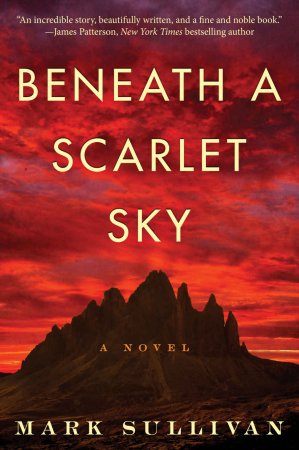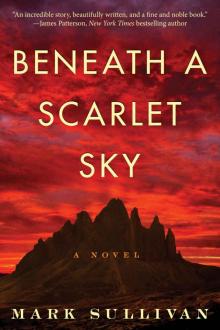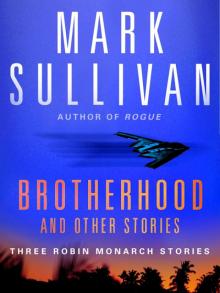- Home
- Mark Sullivan
Brotherhood and Others Page 6
Brotherhood and Others Read online
Page 6
“Erratic?” he said. “I’ve had a beer or two, but I’m in no way impaired.”
“License and registration, sir.”
The man seemed mightily displeased now, but sighed and handed them to Monarch. The driver’s license was international, and identified him as Stephan DeGrave, a native of South Africa and currently a resident of Berlin. Monarch knew him by sight, but it never hurt to double-check.
“Sir, I’d like you to take a simple breath test,” Monarch said, drawing out the canister and plastic tube, twisting on a disposable mouthpiece. “If it’s negative, you’ll be on your way.”
DeGrave eyed the device, turned visibly hostile, but then snatched it from Monarch’s hand. “It will be negative. How does it work?”
“Teeth above and below the mouthpiece, sir,” Monarch said. “Inhale, exhale, and we’re done.”
The phony Breathalyzer was suction activated. When DeGrave inhaled, chloroform filled his lungs. He collapsed into himself. Monarch took the tank from his fingers, turned it off, and stuck it in his pocket. He had not expected it to go this easily, but then again, maybe his luck had changed.
There are protocols to renditions. Monarch followed them, grabbing DeGrave by the collar of his shirt so he could control his head should the man vomit, a common enough reaction to a charged dose of chloroform. He rested him against the door and went back to the cruiser, saying, “Target secure.”
“Transport arriving ninety seconds, Rogue,” the woman replied.
Monarch reached into the police car, flipped off the blinking lights, and looked around: He heard and saw nothing. He stripped off the uniform right there in the rain, ending up in a pair of runner’s tights and a heavy long underwear shirt before returning to DeGrave, who was still out cold.
Monarch kept his feet moving. He was going to be soaked before the truck got here, but it couldn’t be helped. Shivering, waiting, once again he flashed on that image of the fourteen-year-old girl.
* * *
Her name was Antonia Valera. She was the only daughter of Nino Valera, a wealthy Argentine textile trader Julio said was connected to the Perón family. For that reason alone, Robin agreed to help kidnap the girl. His parents were murdered for swindling a second cousin of Evita Perón; and Robin had irrationally hated everything about the family and their friends ever since.
Antonia attended a private Catholic secondary school. Every morning she arrived at 7:55 in a black Mercedes E500 with tinted windows, driven by a young man wearing a uniform with a cap and dark sunglasses. Every afternoon at 3:45, she got back in the car, and was driven to tennis, piano, or equestrian lessons. She had two friends who lived similarly inside secure compounds in one of the finest neighborhoods in Buenos Aires. They seemed to be her only other contacts outside her family.
“She’s guarded everywhere she goes,” Robin complained to Julio after they’d done enough scouting to figure out her routine.
They sat on a bench outside a ramshackle wooden house on the outskirts of the Villa Miserie, the Village of Misery, one of the worst slums in Buenos Aires, a wretched place a world away from the posh existence of young Antonia Valera.
But to Robin, the house was home. It served as a kind of barracks for the Brotherhood. Some nights as many as fifteen tattooed members slept there, along with half a dozen recruits, street kids who wanted into the gang.
That morning, while others in La Fraternidad formed teams to either run a pickpocket operation in a popular tourist area or a short con elsewhere, Julio had asked Robin to stay behind to discuss the kidnapping.
The gang leader was not quite as tall as Robin, but outweighed him significantly. Smart and cunning, Julio had an angle on everything, which made him highly unpredictable, and highly creative.
“You’re right, Robin, she is guarded,” Julio said at last. “And we don’t want to be involved in any kind of shooting if we can avoid it. So we’ve got to follow Rule number ten: Improvise.”
Robin shook his head. “I don’t get it.”
“When you improvise, you’ve got to let your brain think left, right, upside down,” Julio replied. “Sooner or later, it comes to you.”
“How to kidnap the girl?”
“That’s right,” Julio said smiling, revealing a gold tooth he’d had put in to replace one he broke in a street fight. “In this case, we just had to think left right, instead of upside down.”
“Meaning?”
“Meaning to kidnap the girl, we have to kidnap her driver first.”
* * *
The truck appeared from the direction of the autobahn, a large cargo transport with a high ceiling box on the back. It pulled in front of DeGrave’s Porsche and stopped.
Monarch glanced at his watch—ten past eight—and timed what happened next.
The rolling rear door flew up. Two men lowered ramps. A third man ran a winch cable to the front bumper of DeGrave’s Porsche. Monarch reached in and released the parking brake. The Porsche slid up into the box. The door lowered.
Thirty-seven point four one seconds.
“Copy?” Monarch said.
“Affirmative,” the woman said.
“Tell our contact the keys will be in the gas tank.”
“ETA at crossing?”
Monarch checked his watch. “One hour, forty minutes.”
He went around the truck and climbed into the passenger side. The driver, Abbott Fowler, was dressed in a gray workman’s coverall. Shorter than Monarch, he had a face that also seemed a meld of many races, the kind of guy you could walk by on the street and never notice.
Fowler set the truck in gear, pulled out, and drove on toward the town of Möckern. A mile down the road, they passed a gate. Fowler gestured at it. Monarch nodded, figuring they’d be going through it sometime before dawn.
Then he ducked between the seats, through a curtain, and into the rear of the truck. The interior was brightly lit. DeGrave’s Porsche had already been ratchet-strapped to the floor at the rear of the cargo space. The South African was up on a hospital gurney, stripped free of everything except a medical bracelet on his left wrist that indicated he was allergic to sulfites.
DeGrave was fitted with an oxygen mask. A big Samoan man in street clothes was frowning as he worked to get an adult diaper on DeGrave. The diaper was protocol in a rendition. You didn’t want them pissing or shitting the bed during transport.
“Get it nice and tight, Tats,” Monarch said to the Samoan.
John Tatupu winked at him. “Just what I trained my whole life for, Robin.”
The IV in DeGrave’s arm was also protocol, and the doctor and two nurses, all CIA contractors, were attaching leads to DeGrave’s chest that ran from monitors that were bolted to the wall of the truck and spitting out data on his pulse, blood pressure, and O2 saturation.
“He stable?” Monarch asked the doctor, a sandy-haired man in his thirties. He didn’t know the doctor’s name. He didn’t want to know the doctor’s name.
“Yes,” the doctor said. “We’ll ease him into a twilight sleep for the ride.”
Monarch stared down at DeGrave, thinking about what they knew of him.
South Africa is the only country to have ever unilaterally dismantled its nuclear weapons. When it did, in 1989, the decision effectively ended all government funding for weapons-based nuclear science. Men whose lives had been spent developing these weapons were suddenly out of jobs.
DeGrave, a physicist with a doctorate from Cambridge, had been one of the rising stars in South Africa’s nuclear brain trust. He was also a man given to excess when it came to women, wine, cars, and food. Suddenly without an income and no wish to work at a pittance for a university, DeGrave took an alternate route, one that led him into the shadows.
In the prior sixteen years, the South African had advised the nuclear weapons programs of Pakistan, India, Israel, and Russia. He’d made a fortune doing it and owned homes in six countries, including Germany. The CIA now believed DeGrave had been hired by Iran. The a
gency had bugged his homes, offices, and computers, but the South African had been clever, revealing no hard evidence that could link him to the Iranians.
That ended when the scientist for hire bought a ticket to Istanbul. Agents trailed him across Turkey to the border crossing east of Dŏgubayazit, where he was seen entering Iran. He surfaced at the same border crossing two weeks later, and made it to Istanbul with enough time to catch his flight back to Berlin. As it had been described to Monarch, the threat that DeGrave posed was potentially life altering for millions of people in the Middle East.
A decision was made. DeGrave would be taken, interrogated with the use of cutting edge techniques, and then returned to his home with his car and tucked into bed, reeking of the German vodka he liked to drink. He’d likely never remember being pulled over at all. The truck sped up and curved right. They must have passed Möckern, and Fowler was taking them east on the E 30 to E 21 autobahns that crossed Germany south of Berlin.
Monarch pivoted back toward the curtain, and was crouching to return to the cab when the automatic gunfire erupted, raking the side of the truck, which veered hard, went up on two wheels, and began to tip over.
* * *
The chauffeur who drove Antonia Valera to and from school also drove her mother all over Buenos Aires. But with few exceptions, he was always in the area of the school a solid forty-five minutes before the girl’s pickup. He usually stopped for a cup of coffee in a café not far away and flirted with a particularly bosomy waitress.
Julio considered taking the chauffeur as he left the café, then opted for a better choice. On those days when the chauffeur drove Antonia to tennis lessons, he often parked in the shade of trees by the Palermo Woods, a large city park, where he reclined the back of his seat and took a nap.
Hiding in the thick vegetation not far away, Julio and Claudio were ready when the chauffeur at last tugged his cap down over his eyes. Robin was less sure. Then again, he was taking the biggest risk, wasn’t he? If it all went wrong, wouldn’t he be the one to take the fall? As much as the sixteen-year-old hated the Perón family and their friends, he feared the Buenos Aires police even more. Two officers had killed his parents.
Getting caught was unthinkable. Not an option. Getting caught meant death. Robin was still sure of that.
Julio, who was watching the street and the sidewalks, tapped Robin on the back and whispered, “Now.”
Robin glanced at Claudio, whose eyes danced with excitement.
There was only one thing to do then, he decided. He broke from the bushes, jumped off a low retaining wall and, ambled toward the black Mercedes carrying a thin metal bar, a window jimmy that Claudio had fashioned to boost cars. Robin walked right up to the passenger side door, and as if he had not noticed the sleeping chauffeur, started working the jimmy into the gap between the window and the door gasket.
He’d made three quick tries before he heard the chauffeur yell, “Hey!”
Robin prayed the man was unarmed and ducked down as if to peer into the tinted window. The driver’s side opened. The chauffeur shot out. He was ten years older than Robin and surprisingly fit.
Robin waited until the driver almost had him before bolting back down the sidewalk with the man right on his heels. Vaulting up onto the retaining wall, he dodged into the brush, taking no more than five steps before he felt the driver’s fingers grab the back of his T-shirt.
Then he heard the impact, and a grunt, and felt his shirt tear before a crashing sound slowed him. Julio had tackled the chauffeur, who was cursing and struggling. Claudio carried a homemade sap—a sock packed with sand—swung it hard, and hit the man behind the ear. He slumped.
“Okay, then,” Julio said, panting and looking at Robin. “Strip.”
Less than five minutes later, Robin climbed into the Mercedes wearing the chauffeur’s uniform, cap, and sunglasses. He lay back on the reclined seat, trying to control his breathing, hyperaware of every minute that passed until it was time to pick up the girl.
Robin was roughly the man’s height if not his girth. The girl usually looked tired and irritable when she left her tennis lessons, and normally climbed into the backseat without the driver having to get out. The theory was that she would not look at him too closely until it was too late. But what if she ducked in, said something to him, and expected an answer before taking her seat? What if—?
It was time. Taking deep breaths to calm down, Robin twisted the key and the Mercedes started. He put the car in gear, drove to the entryway to the Buenos Aires Lawn Tennis Club, and pulled in exactly where the driver had the last six times they’d watched him pick up Antonia Valera. He had the vehicle in park no more than ten seconds when she appeared at the front door of the club. It was the first time he’d seen her up close.
Antonia’s long black hair was wet, as if she’d taken a shower minutes before. Carrying a bag with her tennis rackets, she wore a white tennis skirt, blue polo shirt, and sandals, and walked to the car in a gangly, awkward gait. She reached for the door handle. Robin looked straight ahead, picking up her movement in the rearview.
He saw the tennis bag thrown across the seat before she climbed in and slammed the door. “Fuck, I hate tennis,” she said, and slammed back into the seat, arms crossed, eyes closed. Her fingers came up to pick at her braces.
Robin threw the vehicle in gear, causing the door locks to set. He reached over to the controls and, as Julio had told him, turned on the child protection buttons for the windows and rear doors. Leaving the tennis club, his attention darted constantly to the mirror, but she just sat there, eyes closed, fuming.
The girl did not figure out something was wrong until Robin slowed to a stop,and flipped the car door locks open. Wearing a hood, Julio yanked open the door on the girl’s side, and pushed her toward the center, even as Claudio came in from the left.
Antonia Valera became hysterical and began to fight.
* * *
Why is it that kidnappings, renditions, stealing someone never goes exactly according to plan? Monarch wondered as he slammed into the right wall of the truck.
The truck righted, accelerated. Amid the chaos that ensued after that evasive maneuver, Monarch ignored everything but the threat.
“Abbott, get them behind you,” he shouted. “If you see them try to shoot the tires, hit your brakes. But warn me!”
Monarch lurched toward the rear door of the van, grabbed a .12 gauge semiautomatic shotgun hanging in a bracket on the wall. He threw the locking mechanism. The door sagged.
“Moving behind us!” he heard Fowler shouting.
Monarch went to his right side on the truck floor, with his right arm extended overhead and holding the shotgun. He grabbed the roll-up door handle with his left hand and raised it three inches, revealing the near-blinding headlamps of whoever the hell was shooting at them.
All Monarch could see was the vehicle grille and part of the windshield. That was enough. He swung the barrel of the gun at the driver’s side and touched the trigger twice, aimed left and touched it twice more.
The windshield turned into a milky gray spider’s web. The late model BMW veered, braked, skidded, and was rear-ended by a lorry.
Monarch slammed the door down and shouted, “They’re done.”
The doctors and nurses seemed shaken by the ordeal, but went back to working on DeGrave. Tatupu said, “Any idea who they are?”
“None,” Monarch said, moving toward the South African nuclear scientist’s Porsche. “And I’m not going back to find out.”
He set down the shotgun and said to the Samoan, “There was no tail from the transfer. They just came out of nowhere. Glove up.”
Tatupu understood. He put on latex gloves, got out Maglites and started going over the car. Monarch triggered his mike and said, “Rogue.”
“Go Rogue,” the woman replied.
“We had company. East bound E 30, east of Shopsdorf. Late model BMW four door, unknown license, unknown occupants. Autobahn police should be responding
.”
“I’ll let our contact know.”
“They knew our line of travel, Monarch informed her. “We suspect a bug and will reroute when it’s found. .”
“Anticipated delay?”
“One hour,” he said.
“That doesn’t give them much time to work with him.”
“Better than not getting there at all.”
A pause. “Agreed.”
Monach clicked off the mike. The Samoan held up a magnetic GPS transmitter that had been fitted inside the rear bumper of the nuclear scientist’s car. They deactivated the device and put it in an evidence sleeve to be checked for fingerprints.
“Iranians?” Tatupu asked.
“Crossed my mind,” Monarch admitted. “Or the Russians. Or the North Koreans. Or DeGrave might just have a serious security company on call. Maybe he tripped a signal when I pulled him over. I don’t know.”
Monarch called forward to Fowler, told him to get off the autobahn, then he went over to DeGrave, and the medical team caring for him, thinking that a man had to lead a very, very complicated life to cause two different armed teams to come after him on the same night.
What have you been up to, Mr. DeGrave? Monarch thought. What deep dark secrets will you reveal tonight?
* * *
The doors slammed shut and Robin pulled away, his heart exploding in his chest because Antonia Valera was freaking out in the backseat of the Mercedes. Still hysterical, she tried to lunge across Julio toward the door, but he clamped one hand against her mouth and another against the back of her neck, and slammed her back between him and Claudio, who held down her arms.
“You hush up now,” Julio commanded from under his hood. “You hear? You hush up. Be cool, and you’ll live. This’ll all be just some bad dream.”
The girl looked terrified in the rearview, and Robin felt hollow, like he’d done something very, very wrong. He didn’t mind stealing things. In his mind, stealing had always been about survival, a way to get by without hurting anyone.
But Antonia Valera’s reaction made Robin feel the way he had seeing his parents gunned down. Orphaned. Petrified of the next moment.

 Beneath a Scarlet Sky
Beneath a Scarlet Sky The Last Green Valley
The Last Green Valley Beneath a Scarlet Sky: A Novel
Beneath a Scarlet Sky: A Novel Brotherhood and Others
Brotherhood and Others The Purification Ceremony
The Purification Ceremony